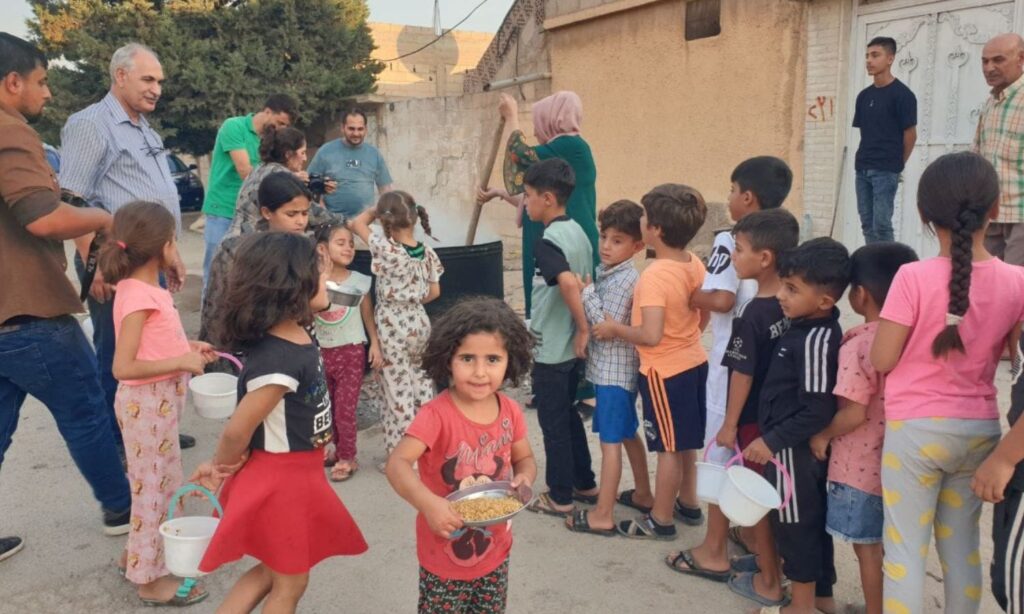Al-Hasakah – Majd al-Salem
The preparation of “saliqa” bulgur in al-Hasakah and its countryside is one of the old traditions passed down through generations in the region, reflecting the customs and traditions of the local community.
Despite its decline in recent years, the “saliqa” season began in mid-September for some families. This involves boiling wheat grains, then drying and grinding them to produce bulgur, a staple on the dining table for the region’s inhabitants.
Cheaper than the market
Nuzha al-Hussein, 50, from the rural area of Jazaa town southeast of Qamishli, aims to provide bulgur at a lower cost by preparing “saliqa.” Buying it ready-made from stores costs several times more than making it at home.
She told Enab Baladi that the price of a kilogram of ready-made bulgur from the market reaches up to 15,000 Syrian pounds. Hence, buying a 20-kilogram bag of bulgur as winter stock costs a family 300,000 Syrian pounds (20 USD), whereas preparing a quantity that exceeds 20 kilograms can be achieved at half the cost if the family makes “saliqa” and bulgur at home.
During Enab Baladi‘s tour of Qamishli’s markets, the price of a kilogram of wheat (grain) was 6,500 Syrian pounds, while the price per kilogram of bulgur was 14,000 Syrian pounds.
Part of the memory
Al-Hussein does not hide her happiness while preparing “saliqa,” considering it part of beautiful childhood memories and an unforgettable ritual. Children of the village gather around the large pot, filled with tens of kilograms of wheat submerged in boiling water, watching eagerly as it cooks. Each of them holds a small plate to receive their share of “saliqa.”
Al-Hussein told Enab Baladi that both children and adults love “saliqa.” Each person takes a portion after it is well-cooked and the grains have swollen, places it in a small plate, adds a bit of salt or a preferred spice, and eats it directly.
Home-made bulgur
The preparation of “saliqa” begins by placing a large pot, with a diameter of about a meter or a meter and a half, on a fire. The pot is filled with an appropriate amount of water and the cleaned and sieved wheat is added.
The quantity added depends on the size of the pot. The fire is lit beneath it until the wheat is well-cooked and swells. Often, wood is used to ignite the fire, according to Yusur al-Khalif (55 years old) from southern rural Qamishli.
Afterward, the drying location is prepared before the wheat is fully cooked, usually on house rooftops with a protective cover serving as a barrier from the surface.
“Saliqa” is left for several days, turned daily, preferably during breezy days for good drying and to prevent spoilage from moisture. Once completely dry, it’s ready to be taken to the mill for bulgur production.
Decline in preparation
Previously, all village residents used to prepare “saliqa.” “Every village had one or more pots, which were loaned out in turns for grain cooking days,” said Hassan al-Rumaid, 59, a resident of Khwaitla village in rural Qamishli.
Regretfully, Hassan continued to tell Enab Baladi that after the “saliqa” season came the mill or known as the “jarousha” (a machine for crushing and grinding wheat to make bulgur, mounted on four wheels and pulled by a horse). Its arrival in the village was considered a unique and special ritual.
He added that the “jarousha” remained in each village for several days, depending on the village size, until all the “saliqa” was crushed for everyone.
Nowadays, however, the “jarousha” has disappeared, taking with it “all those rituals and memories.” The small quantities of “saliqa” currently prepared are ground in city mills, concluded al-Rumaid.
According to what residents of al-Hasakah villages told Enab Baladi, the deteriorating economic conditions and years of drought have negatively impacted the production of bulgur provisions from “saliqa.” Farmers can no longer keep wheat sacks as before; their priority is to sell wheat to pay off debts.
Moreover, migration from the countryside to the city in search of work, or even emigration to foreign countries, and the change in the population’s lifestyle, have made “saliqa” merely a ritual expressing nostalgia for the past, as observed by Enab Baladi. Some Qamishli neighborhood residents prepare “saliqa” to distribute it among children and local residents who enjoy the atmosphere and rituals, not as a winter food stock.

